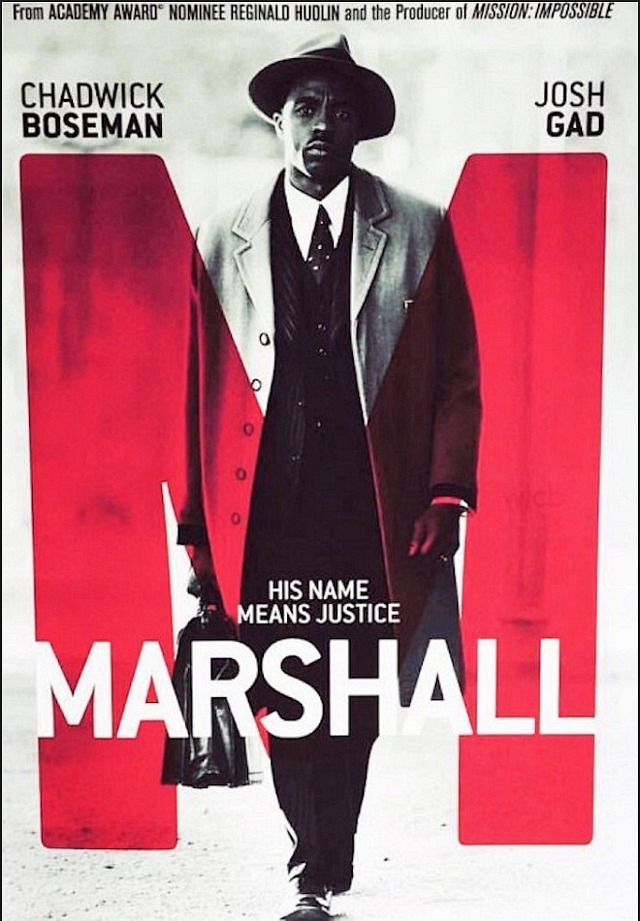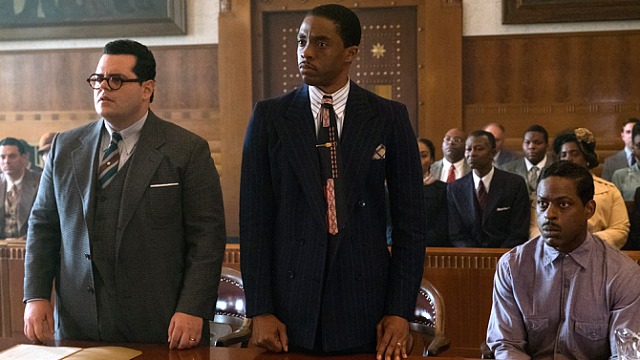Reginald Hudlin‘s Marshall (Open Road, 10.13) is a reasonably engaging, racially-charged courtroom drama in the classic mold, and by that I mean it follows a certain scheme (good-guy underdog vs. tainted establishment) and a certain path (things look shaky and then dispiriting for the good guys before the clouds part and God smiles). You can say “I’ve seen this kind of thing before” but it’s the singer, not the song, and anyone with a fair-minded attitude would have to conclude that Marshall is at least somewhat different, and that Hudlin (who hasn’t directed a feature since ’02’s Serving Sara) has done a better-than-decent job of fusing it all together.
Marshall doesn’t re-invent the wheel, but it’s a moderately okay, good-enough thing. It’s intelligent, efficient, well-shot, not a burn, contains decent performances, etc.

Marshall is about an innocent black defendant charged with raping a white woman, and defended by a heroic, soft-spoken, highly principled attorney, and with the locals 100% convinced, of course, that the black guy did it, but with late-arriving testimony eventually pointing to the defendant…well, not being exactly “innocent” but at the same time not guilty of having initiated contact, much less sexual assault.
Sound familiar? The same kind of rape trial served as the dramatic centerpiece of To Kill A Mockingbird, except here it’s (a) a true story, (b) set in 1940s Bridgeport, Connecticut instead of early 30s rural Alabama, and (c) focuses not on some noble Atticus Finch-like character but young NAACP attorney and future Supreme Court Justice Thurgood Marshall (Chadwick Boseman) as the principal defender.
Assisting Marshall (76 years ago as well as in the film) is another real-life figure, Jewish civil attorney Sam Friedman, who was forced to handle the case verbally and procedurally when the presiding judge (James Cromwell) forbade Marshall from speaking during the trial due to his not being a member of the Connecticut bar.
Boseman (Black Panther, 42, Get On Up) plays Marshall like a brilliant, well-mannered hotshot who’s just parachuted in from 2017. A very good-looking, well-dressed black attorney with a low-key, “everything’s cool but don’t fuck with me” attitude like Steve McQueen‘s Lieutenant Bullitt. He talks tough, throws some punches in a bar, drinks water from a “whites only” fountain, winks at the ladies, and says “fuck you” to a fellow attorney in a rare moment of anger.
Given the unenlightened racial attitudes that unfortunately prevailed in the early 40s, you might expect Boseman to sprinkle a little Sidney Poitier into his performance, but nope. He’s well-mannered but blunt-spoken, confident, straight from the shoulder, no pussyfooting around. A cool-cat fantasy figure.
The Hollywood Reporter‘s Todd McCarthy has called Marshall “a solid, straightforward courtroom drama with proud liberal credentials, one that could have been made by Norman Jewison around 1967″ — too true. “But it remains to be seen if, at this particularly fraught moment of heightened racial sensitivities, a modern audience will care to sit still for this traditionally told old-fashioned history lesson.”
Translation: The knuckle-draggers will avoid Marshall like the plague, and the viewership will probably be limited to 45-plus, college-educated, New Yorker-reading couples
Hudlin’s direction is rote and middle-of-the-road-ish, but sufficient for the task. The script by Jacob Koskoff (Macbeth, The Mark Pease Experience) and his father Michael, a 70something, Westport-residing civil rights attorney, is lean and direct. The supporting cast (Sterling K. Brown as the defendant Joseph Spell, Kate Hudson as his alleged victim Eleanor Strubing, Cromwell, Dan Stevens as Bridgeport prosecutor Lorin Willis) hit their marks and don’t get in the way.
Here’s a good summary of the actual case, written 12 years ago for legalaffairs.org by Daniel J. Sharfstein.

(l . to r.) Josh Gad, Chadwick Boseman, Sterling K. Brown.












